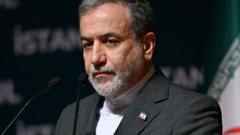The U.S. administration's shift towards economic engagement with Syria may redefine regional dynamics.
U.S. Eases Sanctions on Syria: A New Chapter?

U.S. Eases Sanctions on Syria: A New Chapter?
President Trump's recent decision to lift sanctions sparks hope and concerns in Damascus.
The political landscape in Syria is changing once again as President Trump has signed an executive order lifting most sanctions imposed on the war-torn nation. This move has evoked a wave of optimism among Syrians, particularly as the country grapples with dire economic conditions—over 90% of the population is mired in poverty, according to UN reports.
During a diplomatic visit to Saudi Arabia in May, Trump made headlines by proclaiming that the United States would pause its long-standing sanctions as part of a goodwill gesture to help Syria “achieve greatness.” This unconventional announcement marked a significant pivot in U.S. foreign policy towards Syria and the broader Middle East region.
On Monday, the executive order took effect, effectively signaling to global financial institutions that the previous limits on commerce with Syria would not incur repercussions from Washington. This is a crucial signal for the new leadership in Damascus, although some sanctions remain intact and require Congressional approval for repeal.
The U.S.'s warming relations with Syria come not just as an economic lifeline but also amidst expectations set by U.S. officials regarding Syria's management of regional security and diplomatic relations. While these expectations are not framed as strict conditions, they delineate broader goals for President Ahmed al-Shara, who leads the post-Assad government following the ousting of the long-reigning dictatorship.
As the situation evolves, the international community watches closely, balancing hope for recovery with apprehension about the Islamist presidential direction and its implications on Syria's future governance and regional stability.
During a diplomatic visit to Saudi Arabia in May, Trump made headlines by proclaiming that the United States would pause its long-standing sanctions as part of a goodwill gesture to help Syria “achieve greatness.” This unconventional announcement marked a significant pivot in U.S. foreign policy towards Syria and the broader Middle East region.
On Monday, the executive order took effect, effectively signaling to global financial institutions that the previous limits on commerce with Syria would not incur repercussions from Washington. This is a crucial signal for the new leadership in Damascus, although some sanctions remain intact and require Congressional approval for repeal.
The U.S.'s warming relations with Syria come not just as an economic lifeline but also amidst expectations set by U.S. officials regarding Syria's management of regional security and diplomatic relations. While these expectations are not framed as strict conditions, they delineate broader goals for President Ahmed al-Shara, who leads the post-Assad government following the ousting of the long-reigning dictatorship.
As the situation evolves, the international community watches closely, balancing hope for recovery with apprehension about the Islamist presidential direction and its implications on Syria's future governance and regional stability.




















